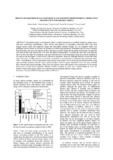Impacts of greenhouse gas and particulate emissions from woodfuel production and end-use in sub-Saharan Africa

View/
Date
2004Author
Bailis, Robert
Pennise, David
Ezzati, Majid
Kammen, Daniel M
Kituyi, Evans
Language
enMetadata
Show full item recordAbstract
Household energy in sub-Saharan Africa is largely derived from woodfuels burned in simple stoves
with poor combustion characteristics. These devices emit products of incomplete combustion [PICs] that both
damage human health and negatively impact the atmospheric radiation budget. We use empirical studies and
published emission factors to estimate the pollution associated with production, distribution and end-use of common
household fuels and assess the impacts of these emissions on public health and the global environment. We find that
each meal cooked with charcoal has 2-10 times the global warming effect of cooking the same meal with firewood
and 5-16 times the effect of cooking the same meal with kerosene or LPG depending on the gases that are included in
the analysis and the degree to which wood is allowed to regenerate. However, although charcoal is worse than other
fuels with respect to GHG emissions, it can lead to reductions in concentrations of pollutants like particulate matter
(PM). Concentrations of PM in households using charcoal were found to be 88 percent lower than households using
open wood fires (charcoal: 465±387 µg/m3; open wood fires: 3764±714 µg/m3 (mean±95% CI)). Two years of health
data collected from Kenyan families using wood and charcoal shows that charcoal users experienced 44-65 percent
fewer cases of acute lower respiratory infection (ALRI) compared to wood users. Understanding the costs and
benefits of household energy options is an important step in designing effective energy policies.
